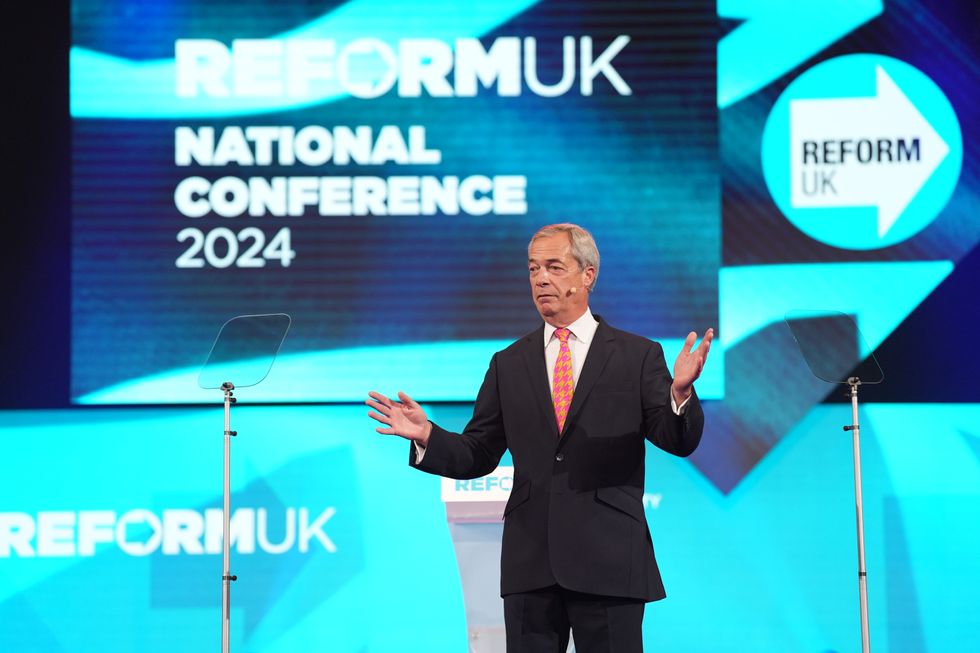Rupert Lowe brands Reform's success as a once in a 100-year event
GB News
Nigel Farage's party has notched up a two-point lead over the two main parties for the first time
Don't Miss
Most Read
Trending on GB News
Reform UK has pulled ahead from the Conservatives and Labour in the opinion polls.
The latest YouGov/Times voting intention survey gives Nigel Farage's party a two-point lead as voters continue to express dissatisfaction with the two main parties.
YouGov figures show Reform on 27 per cent of the vote, reaching record new heights for the second week in a row, having been on 26 per cent last week.
Votes for all other parties remains unchanged, with Labour on 25 per cent, the Conservatives on 21 per cent, the Lib Dems 14 per cent, and the Greens nine per cent.
 'Unbelievable!' Reform UK tops polls AGAIN - but this time there's a nasty surprise for Labour and the Tories
'Unbelievable!' Reform UK tops polls AGAIN - but this time there's a nasty surprise for Labour and the ToriesGetty Images/YouGov
Reacting to the result on X, Reform leader Nigel Farage told his 2.2million followers: "Britain is broken. Britain needs Reform."
One user branded it an "exciting time" for the party, while another suggested the timing could not be worse for Conservatives and Labour as they are still recovering from poll defeats north of the border.
"Those Reform UK figures in Wales and Scotland are unbelievable btw," the user wrote.
Indeed, a ‘mega poll’ conducted by respected pollsters Electoral Calculus earlier this month put Nigel Farage’s party winning 23 of 32 seats in Wales, usurping Labour as the biggest party by a country mile, if an election were held tomorrow.
Starmer’s party would lose 23 of its 27 seats (85 per cent of its representation) in an unprecedented wipeout.
Labour would also receive a drubbing in Scotland if an election were held tomorrow, polling suggests.
The incumbent party would lose 31 of the 37 seats it won in the General Election in July 2024, slashing its representation north of the border by a whopping 83.7 per cent.
The only constituencies which would remain red are Lothian East, Edinburgh South, Airdrie and Shotts, Hamilton and Clyde Valley, Rutherglen and Na h-Eileanan an Iar.
All 31 of the lost seats would flip to the SNP, who are enjoying a surge in fortunes, despite former leader Nicola Sturgeon’s dramatic fall from grace.
LATEST MEMBERSHIP DEVELOPMENTS

Reacting to the result on X, Reform leader Nigel Farage told his 2.2million followers that 'Britain needs Reform"
PADoes this mean Reform is unstoppable? Not quite
Reform is riding high in the opinion polls, but it has much more ground to cover before it can take on the two main parties.
The last General Election underscores the enormity of this challenge.
Reform UK only won five MPs despite coming second to Labour in 98 constituencies as the party's vote share was spread thinly across many constituencies as opposed to concentrated.
Farage's ex-advisor acknowledges this problem, telling GB News: "Our problem is depth, not width. We have support everywhere, but it's not deep enough to win a first-past-the-post election.
"So we can shovel up the millions of votes, but unless we learn to focus effectively, that does not necessarily translate into hundreds of seats."
This is a problem for Reform as it is still largely operating in a "niche market", Curtice tells GB News.
For example, a recent YouGov poll indicates that 90 per cent of individuals who voted for Reform UK in the 2024 general election are considering voting for the party again in the future. This suggests a high level of loyalty among Reform UK voters compared to other parties, who received more wavering support.
On the one hand, this is encouraging, but it also suggests an echo chamber effect, with limits to their broader appeal.
Also, voting patterns have barely shifted since 2019.
At the last General Election, Labour barely increased its support in the Red Wall, suggesting that Reform doesn't have a huge untapped base of voters to go after.
What's more, polling has found Reform's strongest pull is their stance on immigration but this attraction could wane if other parties jump in to fix the issue. There is concern among some academics that Reform is a one issue party.
A lot of Tory voters are unhappy about immigration, but when it comes to the crunch around issues like the economy and the NHS, voters might be inclined to stick to the Tories.
If voters were unhappy about the economy, concerned about the NHS, but were not concerned about immigration, they would go to Labour or the Democrats.
This suggests Reform needs to build a much more robust policy platform to appeal to the wider electorate as the political winds could change, particularly as a recent YouGov poll found 38 per cent of those currently considering voting Reform UK say they would also consider voting for the Conservatives.








